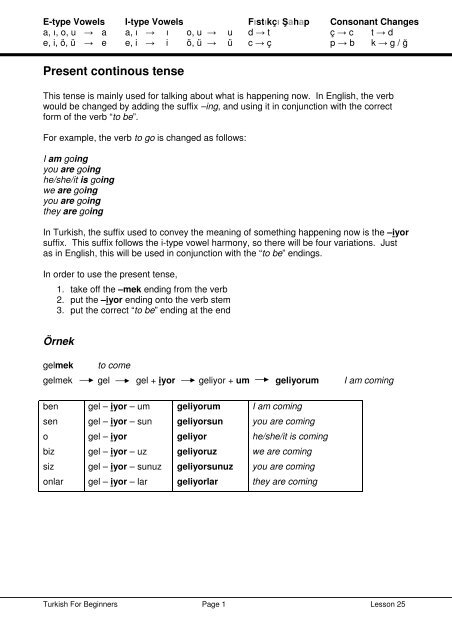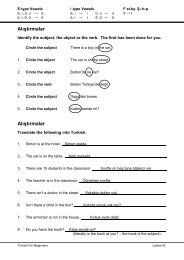Create successful ePaper yourself
Turn your PDF publications into a flip-book with our unique Google optimized e-Paper software.
E-type Vowels<br />
a, ı, o, u → a<br />
e, i, ö, ü → e<br />
I-type Vowels<br />
a, ı → ı o, u → u<br />
e, i → i ö, ü → ü<br />
Fıstıkçı Şahap<br />
d → t<br />
c → ç<br />
Consonant Changes<br />
ç → c t → d<br />
p → b k → g / ğ<br />
Present continous tense<br />
This tense is mainly used for talking about what is happening now. In English, the verb<br />
would be changed by adding the suffix –ing, and using it in conjunction with the correct<br />
form of the verb “to be”.<br />
For example, the verb to go is changed as follows:<br />
I am going<br />
you are going<br />
he/she/it is going<br />
we are going<br />
you are going<br />
they are going<br />
In Turkish, the suffix used to convey the meaning of something happening now is the –iyor<br />
suffix. This suffix follows the i-type vowel harmony, so there will be four variations. Just<br />
as in English, this will be used in conjunction with the “to be” endings.<br />
In order to use the present tense,<br />
1. take off the –mek ending from the verb<br />
2. put the –iyor ending onto the verb stem<br />
3. put the correct “to be” ending at the end<br />
Örnek<br />
gelmek to come<br />
gelmek gel gel + iyor geliyor + um geliyorum I am coming<br />
ben<br />
gel – iyor – um<br />
geliyorum<br />
I am coming<br />
sen<br />
gel – iyor – sun<br />
geliyorsun<br />
you are coming<br />
o<br />
gel – iyor<br />
geliyor<br />
he/she/it is coming<br />
biz<br />
gel – iyor – uz<br />
geliyoruz<br />
we are coming<br />
siz<br />
gel – iyor – sunuz<br />
geliyorsunuz<br />
you are coming<br />
onlar<br />
gel – iyor – lar<br />
geliyorlar<br />
they are coming<br />
Turkish For Beginners Page 1 Lesson 25
E-type Vowels<br />
a, ı, o, u → a<br />
e, i, ö, ü → e<br />
I-type Vowels<br />
a, ı → ı o, u → u<br />
e, i → i ö, ü → ü<br />
Fıstıkçı Şahap<br />
d → t<br />
c → ç<br />
Consonant Changes<br />
ç → c t → d<br />
p → b k → g / ğ<br />
Örnekler<br />
oturmak to sit oturuyorum I am sitting<br />
içmek to drink içiyorum I am drinking<br />
bakmak to look bakıyorum I am looking<br />
öpmek to kiss öpüyorum I am kissing<br />
If there is a vowel at the end of the verb stem, creating a vowel clash with –iyor, then the<br />
vowel at the end of the verb stem is removed.<br />
başlamak to start başla + iyor başlıyor + um başlıyorum I am starting<br />
yemek to eat ye + iyor yiyor + um yiyorum I am eating<br />
uyumak to sleep uyu + iyor uyuyor+ um uyuyorum I am sleeping<br />
Other uses<br />
This tense can be used in several ways as well as to explain what is happening right now.<br />
It can be used for the following purposes:<br />
1. To say what is happenning now.<br />
kitap okuyorum<br />
I am reading a book<br />
2. Stating an unchanging fact.<br />
sigara kullanmıyorum<br />
I don’t smoke<br />
3. Describing something that happens often<br />
her gün plaja gidiyorum<br />
I go to the beach every day<br />
4. Describing something that will happen soon<br />
bu akşam sinemaya gidiyorum<br />
I am going to the cinema this evening<br />
Turkish For Beginners Page 2 Lesson 25
E-type Vowels<br />
a, ı, o, u → a<br />
e, i, ö, ü → e<br />
Alıştırmalar<br />
I-type Vowels<br />
a, ı → ı o, u → u<br />
e, i → i ö, ü → ü<br />
Fıstıkçı Şahap<br />
d → t<br />
c → ç<br />
Use the three words given to make up three sentences, as in the example.<br />
Use the first word with “to be” endings to say what you are.<br />
Use the second word with the possessive ending to say what you have got.<br />
Use the third word with the location suffix to say where you work.<br />
Translate each sentence.<br />
denizci / gemi / deniz<br />
Ben denizciyim. Gemim var. Denizde çalışıyorum.<br />
I am a sailor. I have a ship. I work at sea.<br />
1. şoför / araba / İstanbul<br />
Consonant Changes<br />
ç → c t → d<br />
p → b k → g / ğ<br />
2. bankacı / para / banka<br />
3. doktor / hastalar / hastane<br />
4. öğretmen / öğrenciler / okul<br />
5. polis / tabanca / karakol<br />
6. bakkal / bakkal / bakkal<br />
7. aşçı / lokanta / mutfak<br />
8. garson / tepsi / lokanta<br />
9. asker / silah / ordu<br />
10. çiftci / hayvanlar / çiftlik<br />
Turkish For Beginners Page 3 Lesson 25
E-type Vowels<br />
a, ı, o, u → a<br />
e, i, ö, ü → e<br />
I-type Vowels<br />
a, ı → ı o, u → u<br />
e, i → i ö, ü → ü<br />
Fıstıkçı Şahap<br />
d → t<br />
c → ç<br />
Consonant Changes<br />
ç → c t → d<br />
p → b k → g / ğ<br />
Negative sentences<br />
We have already seen how to negate a verb when we looked at the command form. To<br />
tell someone not to do something, the suffix –me was added to the verb stem.<br />
gelme<br />
don’t come!<br />
When you want to say something is not happenning, the same suffix is used. So in order<br />
to change the above command to present continous tense –iyor needs to be added to the<br />
end.<br />
gelme + iyor + um<br />
But there is a vowel clash! In order to deal with this type of vowel clash, the “e” is removed<br />
from the –me. So that the word becomes<br />
gelme + iyor + um gelmiyorum I am not coming<br />
ben<br />
gel – m – iyor – um<br />
gelmiyorum<br />
I am not coming<br />
sen<br />
gel – m – iyor – sun<br />
gelmiyorsun<br />
you are not coming<br />
o<br />
gel – m – iyor<br />
gelmiyor<br />
he/she/it is not coming<br />
biz<br />
gel – m – iyor – uz<br />
gelmiyoruz<br />
we are not coming<br />
siz<br />
gel – m – iyor – sunuz<br />
gelmiyorsunuz<br />
you are not coming<br />
onlar<br />
gel – m – iyor – lar<br />
gelmiyorlar<br />
they are not coming<br />
Örnekler<br />
oturmak oturmuyorum I am not sitting<br />
içmek içmiyorum I am not drinking<br />
bakmak bakmıyorum I am not looking<br />
öpmek öpmüyorum I am not kissing<br />
Turkish For Beginners Page 4 Lesson 25
E-type Vowels<br />
a, ı, o, u → a<br />
e, i, ö, ü → e<br />
I-type Vowels<br />
a, ı → ı o, u → u<br />
e, i → i ö, ü → ü<br />
Fıstıkçı Şahap<br />
d → t<br />
c → ç<br />
Consonant Changes<br />
ç → c t → d<br />
p → b k → g / ğ<br />
Alıştırmalar<br />
Change the positive sentences into negative sentences. Then translate both sentences.<br />
Örnek<br />
Positive: oturuyorum I am sitting<br />
Negative: oturmuyorum<br />
I am not sitting<br />
1. Positive: geliyorum<br />
Negative:<br />
2. Positive: satıyorum<br />
Negative:<br />
3. Positive: sürüyorum<br />
Negative:<br />
4. Positive: yazıyorum<br />
Negative:<br />
5. Positive: alıyorum<br />
Negative:<br />
6. Positive: koşuyorum<br />
Negative:<br />
7. Positive: bakıyorum<br />
Negative:<br />
8. Positive: veriyorum<br />
Negative:<br />
9. Positive: gidiyorum<br />
Negative:<br />
10. Positive: gülüyorum<br />
Negative:<br />
Turkish For Beginners Page 5 Lesson 25
E-type Vowels<br />
a, ı, o, u → a<br />
e, i, ö, ü → e<br />
I-type Vowels<br />
a, ı → ı o, u → u<br />
e, i → i ö, ü → ü<br />
Fıstıkçı Şahap<br />
d → t<br />
c → ç<br />
Consonant Changes<br />
ç → c t → d<br />
p → b k → g / ğ<br />
Alıştırmalar<br />
Complete the postcard by using the verbs in the present tense form. Change the verbs to<br />
present tense positive statement first, then put them in the correct gaps.<br />
What does the postcard say<br />
geçmek<br />
gitmek<br />
içmek<br />
istemek<br />
oturmak<br />
yazmak<br />
to pass<br />
to go<br />
to drink<br />
to want<br />
to sit<br />
to write<br />
Sevgili Duygu,<br />
Sana İstanbul’dan . Şimdi Boğaz’da bir lokantada ve<br />
kahve . Deniz, manzara ve hava çok güzel. Tatil güzel .<br />
Yarın İzmir’e<br />
. Orada bir hafta kalmak istiyorum. Efes’e de gitmek<br />
.<br />
Sevgilerle,<br />
Hakan<br />
Turkish For Beginners Page 6 Lesson 25



